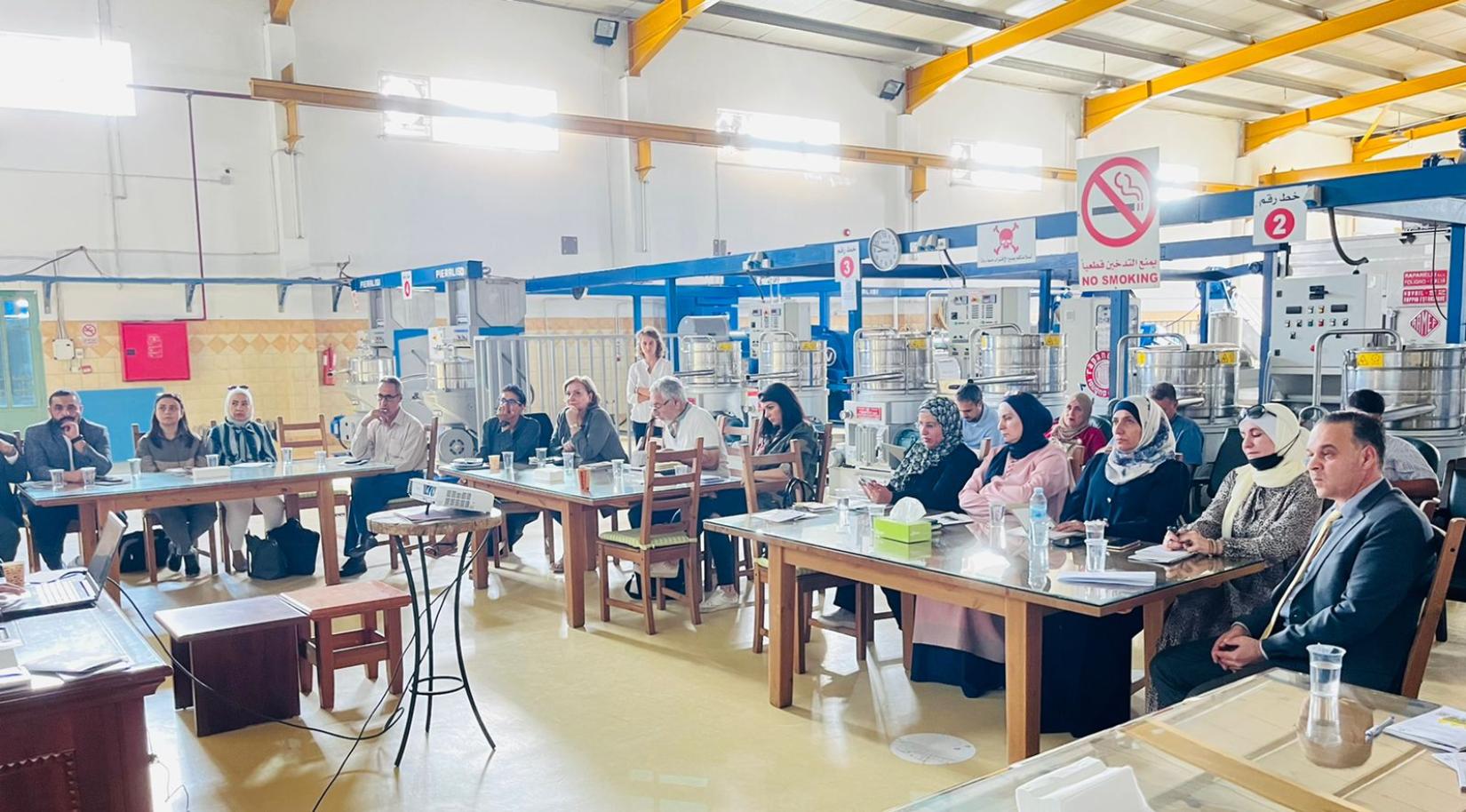FAO/EBRD in collaboration with the Ministry of Agriculture conduct trainings on best practices on olive oil milling and olive oil quality
14 September 2022

Amman - The Food and Agriculture Organization of the United Nations (FAO) and the European Bank for Reconstruction and Development (EBRD), in collaboration with the Ministry of Agriculture and with the support of the European Union (EU), are organizing two training sessions on best practices in olive oil production for key players in Jordan’s olive oil sector. Participants in the training include policy-makers, government officials, large and small millers, and international business leaders, specialists from development institutions and investors. The trainings are organized specifically with the General Syndicate of Jordanian Olive Oil Mills Owners and Olive Producers and the Centre for the Promotion of Imports from developing countries (CBI).
The objectives of this training on milling best practices is to raise awareness among MoA’s agroengineers and mill technicians on the best practice to adopt and pitfalls to avoid in order to produce extra virgin olive oil. From harvesting, transportation, milling to storage, the international expert will go through the different steps of the production process and provide information on the practices to adopt, for example setting up the equipment and the variables to control during the production process, and their impact on the final quality of the product in terms of chemical and organoleptic properties of the oil. The training will be complemented by olive oil tasting sessions, as it is key for millers to also be able identify the positive and negative attributes in the olive oil.
As a result of the training, millers would have consolidated knowledge on the production best practices on milling efficiency and olive oil tasting. This will allow developing the domestic market and improving the visibility of Jordan olive oil on international markets as a producer of extra virgin olive oil.
This initiative is part of a project supporting the olive oil sector by developing sustainable value-chains through knowledge products and technical assistance under the EBRD-EU Value Chains Competitiveness Programme to enhance the competitiveness of small and medium enterprises (SMEs). This programme draws on valuable experience in analyzing and addressing key constraints to the agri-food sector’s development in the SEMED region, in particular in the olive oil value-chain (Morocco, Tunisia, West Bank and Gaza Strip).
Within this project, the FAO Investment Center, in cooperation with the FAO Representation in Jordan, prepared a sector review study to assess the performance of the sector, its opportunities and gaps for transforming the olive oil sector. The sector review will be discussed at the beginning of next month with officials from the public and private sector. In terms of technical assistance, several workshops have been already conducted for olive oil SMEs, including a virtual training on differential strategies on international markets and on olive oil production best practices along the value-chain. The project also contributed to an evaluation of farming practices in selected olive producing farms.
The FAO Representative in Jordan, Engineer Nabil Assaf, stated, "Olives constitute 20% of the total cultivated areas with an estimated area of 570,000 dunums and 72% of the total fruit trees. Olive oil is one of the principal agri-food products in Jordan and a strategic crop from an environmental and socio-economic perspective as it is estimated to provide employment to about 80 000 households.The olive oil industry is an important source of employment for rural Jordanians. The country produces an average of 23,400 tonnes of olive oil per year, but most is sold in bulk to domestic consumers.”
The Director of the Olive Directorate at the Ministry of Agriculture, Engineer Osama Kattan, said, "The government of Jordan, represented by the Ministry of Agriculture, has sought to support the olive sector, given the increasing importance of the olive sector in the national economy, and in coordination with all official and private agencies that deal with the olive tree and olive oil in cultivation and manufacturing and trade within a well-established institutional base, in addition to coordinating with international institutions operating in Jordan to take advantage of their capabilities in serving this sector.”
Within the framework of the training, Mr. Zidan Al-Manaseer, the General Manager of the Modern Jordanian Company for Food Industries, which is hosting the training, stressed the importance of this training to the mill owners before the oil production season, to improve the levels of modern machinery and to improve the quality of Jordanian olive oil.
With demand for olive oil rising across the globe, Jordan’s olive oil sector has excellent potential to grow and tap into new markets, including export markets. And a stronger, more competitive olive oil industry would create jobs along the supply chain, especially for young people.
FAO and the EBRD will build on the experiences gained during the trainings – including support for the promotion of better olive oil quality in Jordan – to foster dialogue and cooperation between the public and private sectors to achieve a more efficient and inclusive olive sector.

